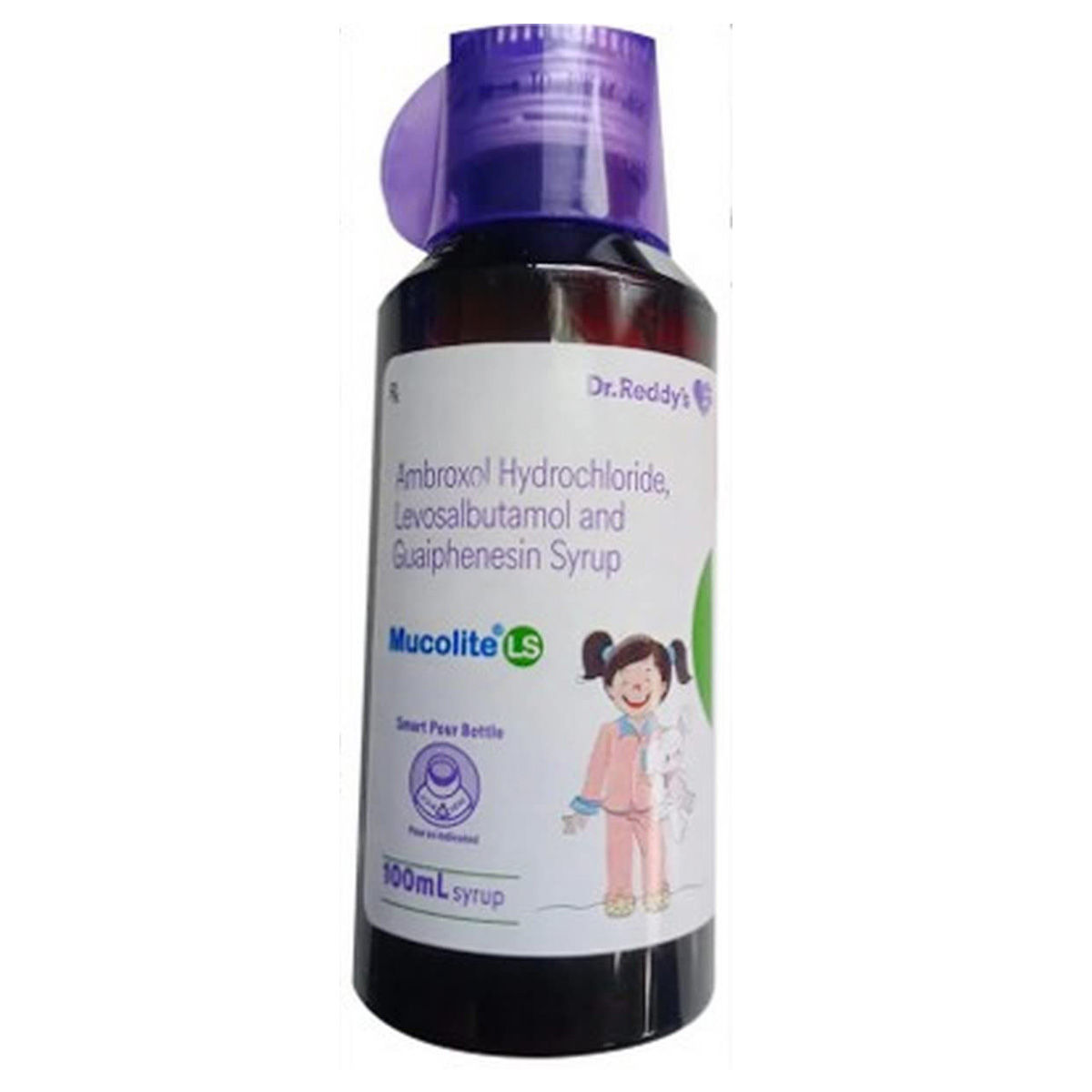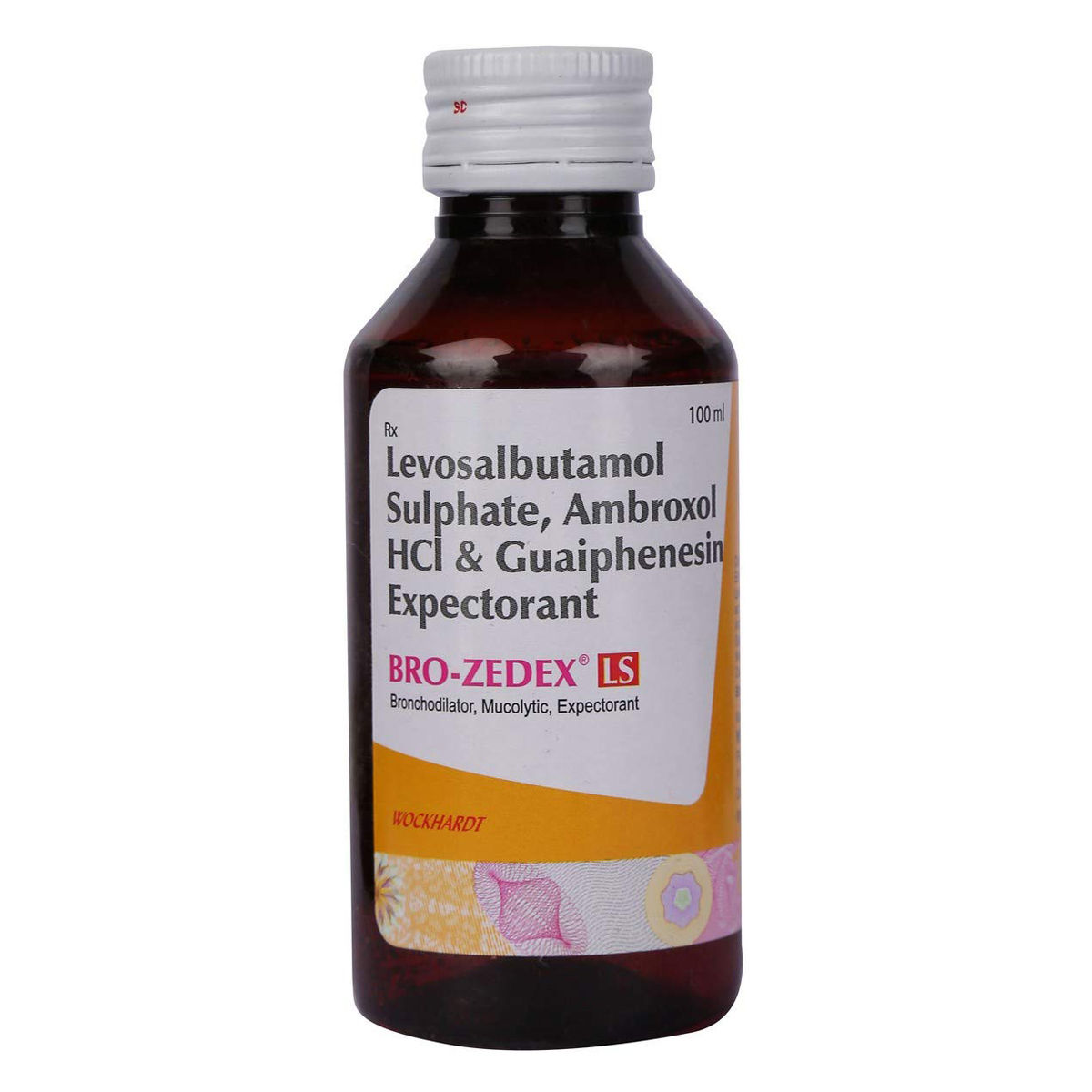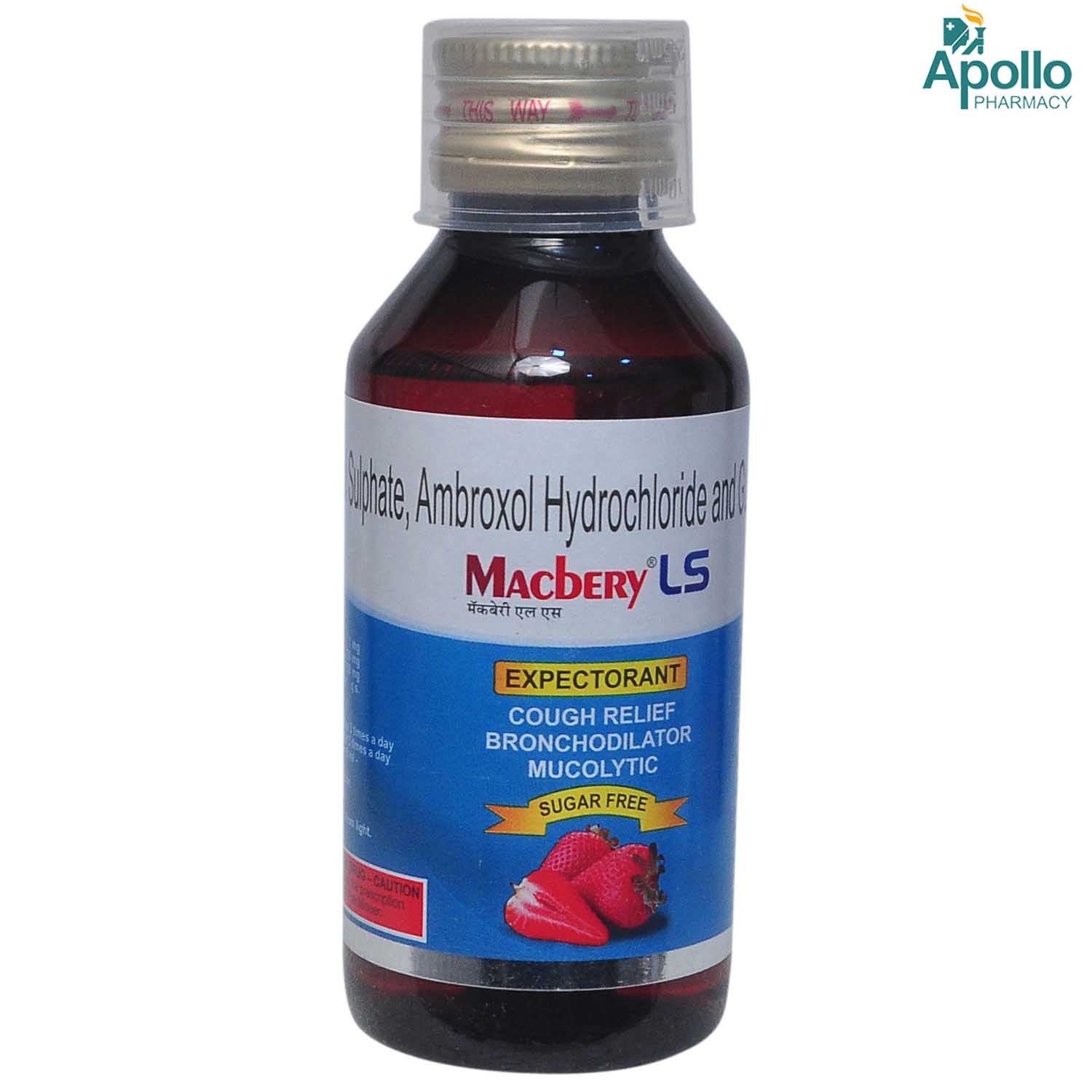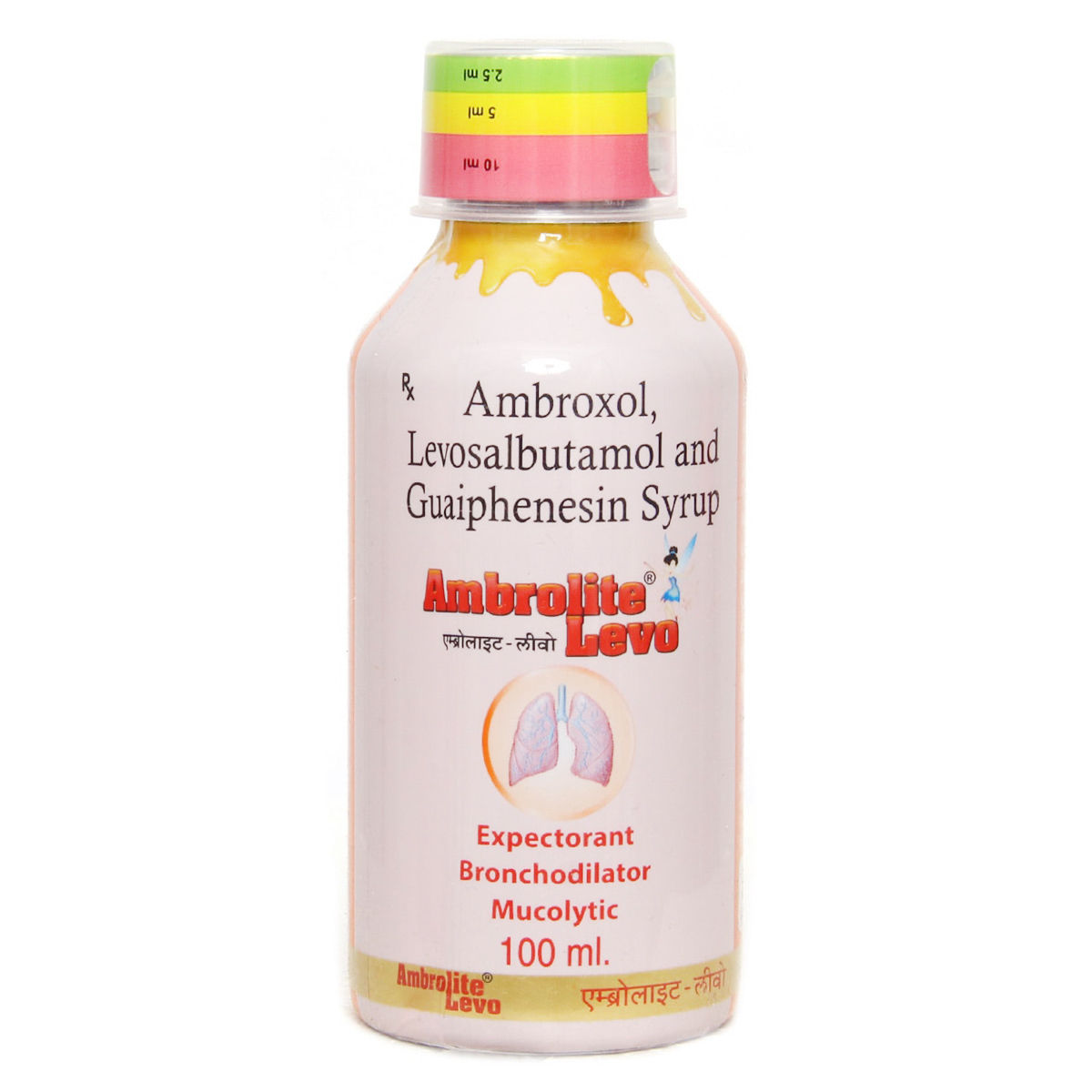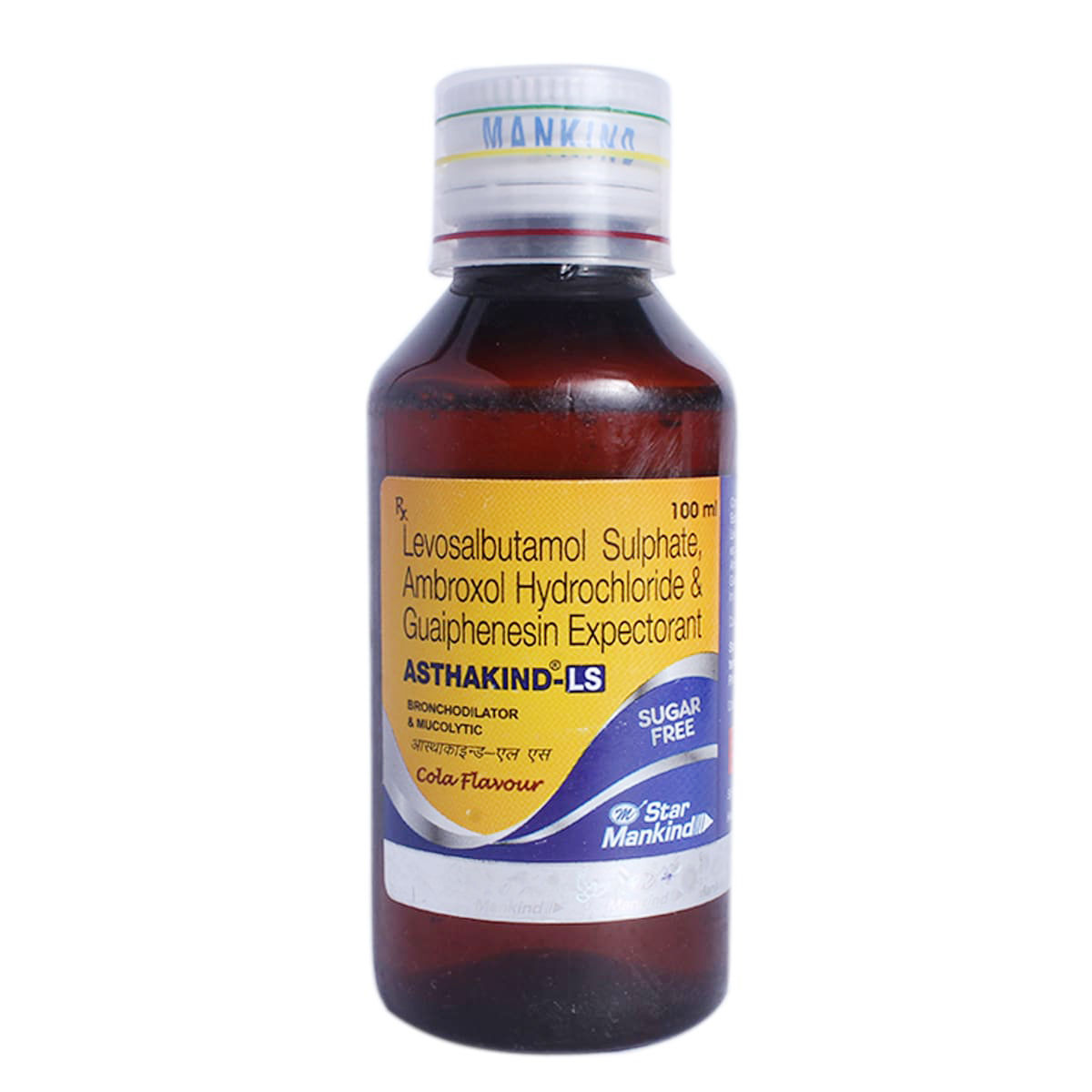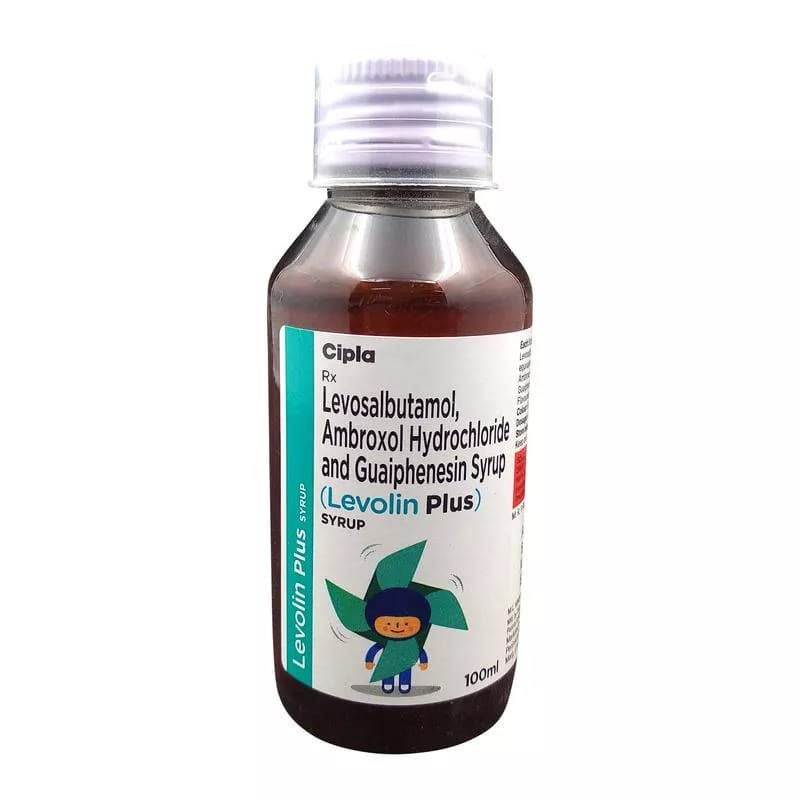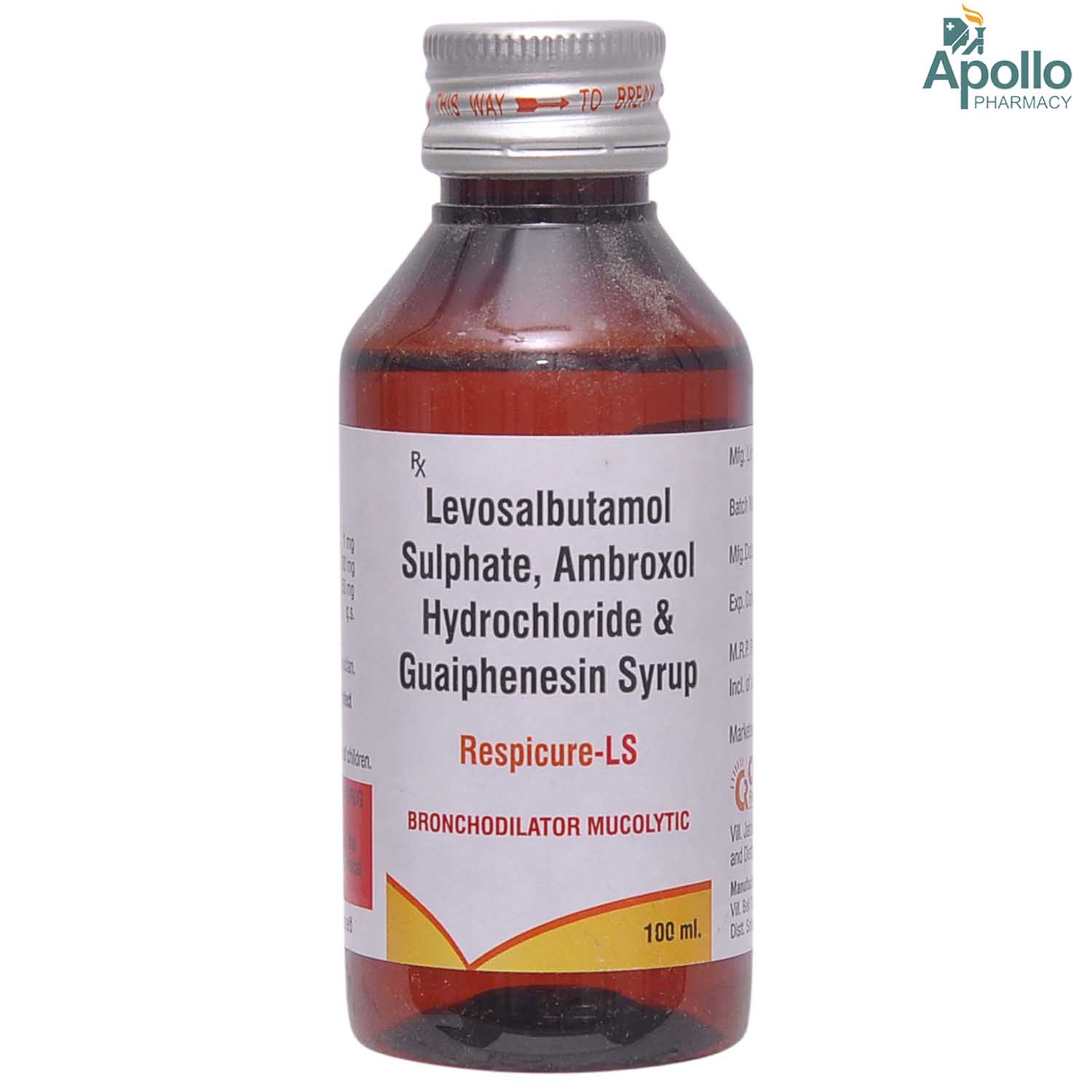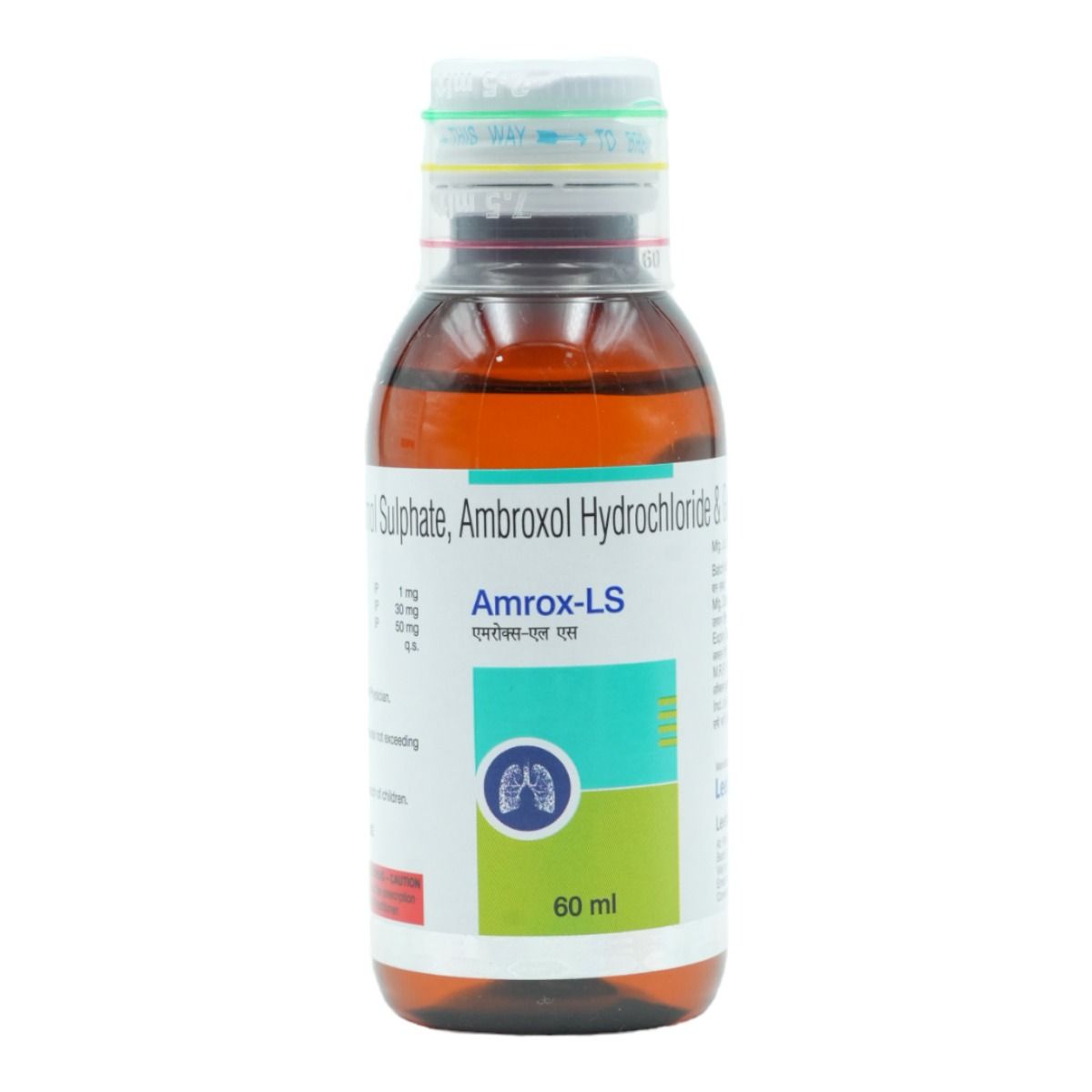Chericof LS Syrup 100 ml
₹105.3*
MRP ₹117
10% off
₹99.45*
MRP ₹117
15% CB
₹17.55 cashback(15%)
Free Delivery
With Circle membership
(Inclusive of all Taxes)
This offer price is valid on orders above ₹800. Apply coupon PHARMA10/PHARMA18 (excluding restricted items)
Know Your Delivery Time
Provide Delivery Location

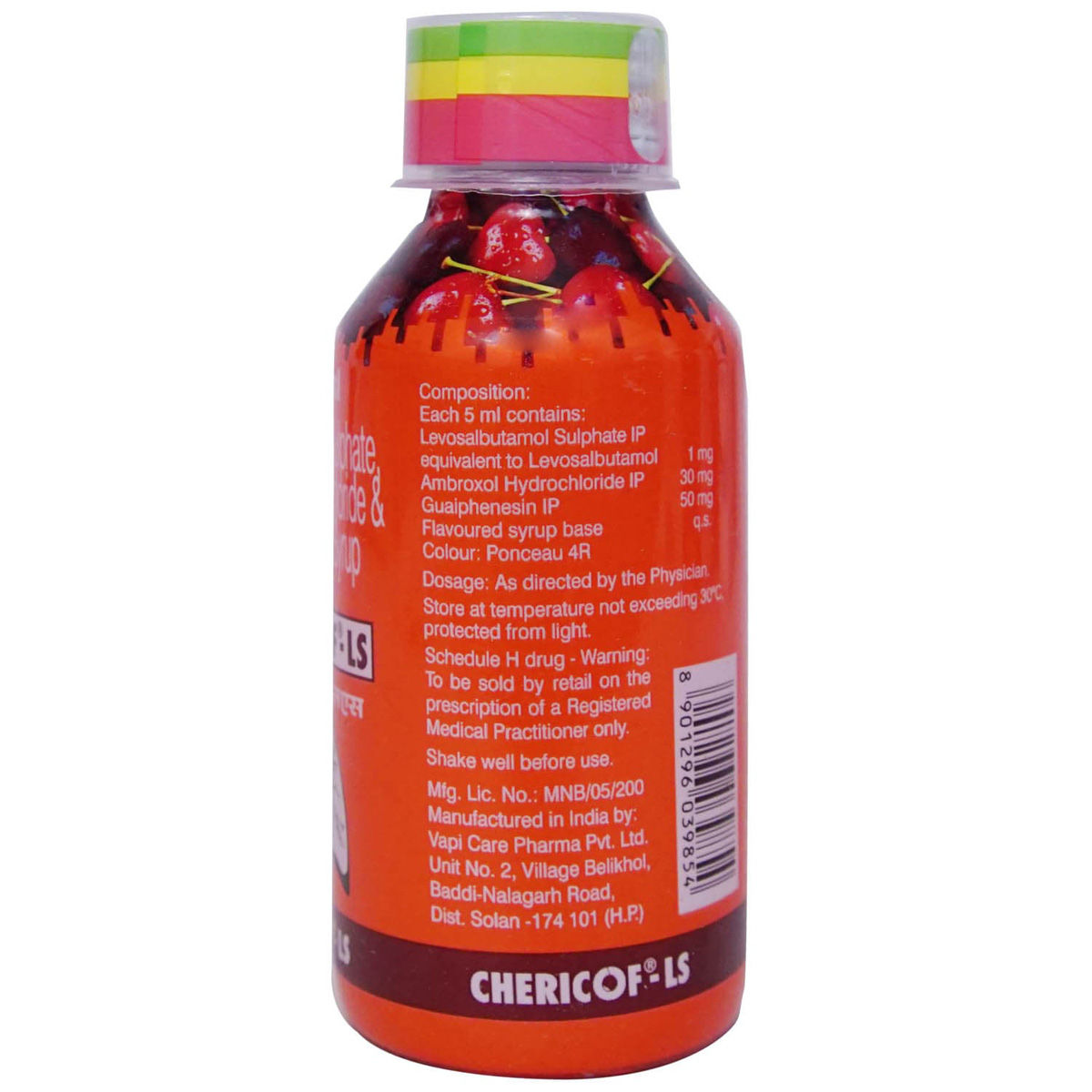
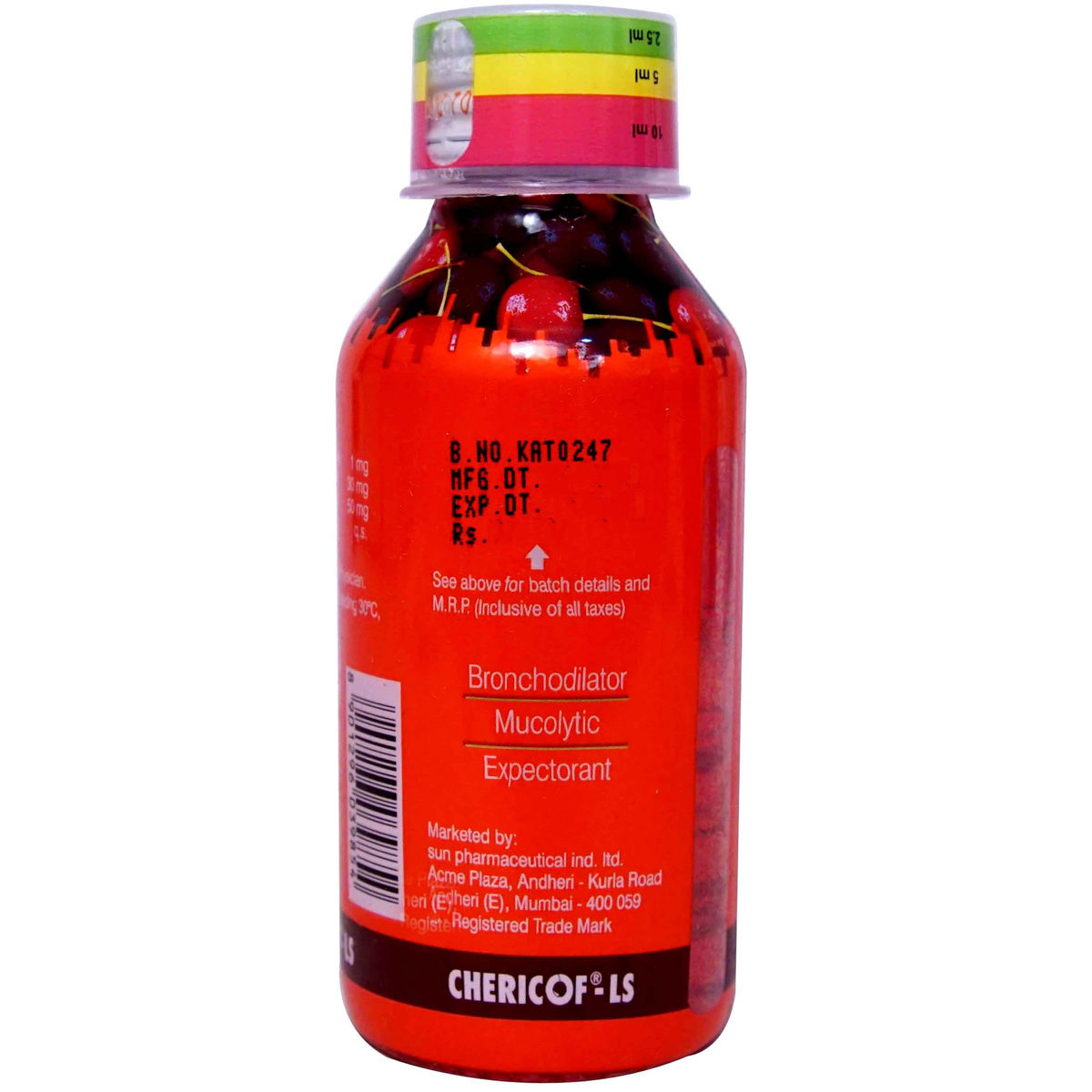
Available Offers
 Prescription drug
Prescription drugWhats That
 68 people bought
68 people bought 
Secure Payment

India's Most Trusted Pharmacy

Genuine Products
Manufacturer/Marketer :
Consume Type :
Return Policy :
Expires on or after :
About Chericof LS Syrup
Chericof LS Syrup is used to treat cough associated with mucus. Coughing (dry or productive) is the body’s way of clearing irritants (like allergens, mucus, or smoke) from airways and preventing infection. There are two types of coughs: dry cough and chesty cough. A dry cough is tickly and doesn't produce any vicious or thick mucus, while a chesty cough (wet cough) means mucous or sputum is produced to help clear your airways.
Chericof LS Syrup is a combination of three drugs, namely Levosalbutamol (bronchodilator), Ambroxol (mucolytic agent), and Guaifenesin (expectorant). Levosalbutamol belongs to the class of bronchodilators that work by relaxing muscles and widening the airways of the lungs. Ambroxol belongs to the class of mucolytic agents (cough/sputum thinner) that work by thinning and loosening phlegm (mucus) in the lungs, windpipe, and nose. Thereby helping to cough out easily. Guaifenesin belongs to the class of expectorants that works by increasing the volume of fluid in the airways, reducing the stickiness of mucus, and helping to remove it from the airways.
Take Chericof LS Syrup as prescribed. Your doctor will recommend how often you take Chericof LS Syrup based on your medical condition. Some people may experience nausea, vomiting, drowsiness, headache, dizziness, skin rash, tremor, stomach upset and diarrhoea. Most of these side effects of Chericof LS Syrup do not require medical attention and gradually resolve over time. However, if the side effects persist or worsen, please consult your doctor.
If you are allergic to Chericof LS Syrup or any other medicines, please tell your doctor. If you are pregnant or breastfeeding, it is advised to inform your doctor before using Chericof LS Syrup . If you are suffering from fits or have a history of fits, please inform your doctor before taking Chericof LS Syrup as it may increase the risk of recurrent fits. If you have diabetes, regular monitoring of blood sugar levels is recommended while taking Chericof LS Syrup . Drink plenty of fluids while taking Chericof LS Syrup to loosen mucus. If you have diabetes, fits, high blood pressure, overactive thyroid, stomach ulcers, phenylketonuria (a birth defect that causes accumulation of amino acid, phenylalanine in the body), kidney, liver, or heart problems, inform your doctor before taking Chericof LS Syrup .
Uses of Chericof LS Syrup
Directions for Use
Medicinal Benefits
Chericof LS Syrup is a combination of three drugs: Levosalbutamol, Ambroxol, and Guaifenesin, which are used to treat coughs associated with mucus. Levosalbutamol belongs to the class of bronchodilators that work by relaxing muscles and widening the airways of the lungs. Ambroxol belongs to the class of mucolytic agents (cough/sputum thinner) that work by thinning and loosening phlegm (mucus) in the lungs, windpipe, and nose. Thereby helping to cough out easily. Guaifenesin belongs to the class of expectorants that works by increasing the volume of fluid in the airways, reducing the stickiness of mucus, and helping to remove it from the airways.
How Chericof LS Syrup Works
Storage
Side Effects of Chericof LS Syrup
- Nausea
- Vomiting
- Drowsiness
- Headache
- Dizziness
- Diarrhoea
- Skin rash
- Tremor
- Stomach upset
What if I have taken an overdose of Chericof LS Syrup
Drug Warnings
If you are allergic to Chericof LS Syrup or any other medicines, please tell your doctor. If you are pregnant or breastfeeding, it is advised to inform your doctor before using Chericof LS Syrup . If you are suffering from fits or have a history of fits, please inform your doctor before taking Chericof LS Syrup as it may increase the risk of recurrent fits. If you have diabetes, regular monitoring of blood sugar levels is recommended while taking Chericof LS Syrup . Drink plenty of fluids while taking Chericof LS Syrup to loosen mucus. If you have diabetes, fits, high blood pressure, overactive thyroid, stomach ulcers, phenylketonuria (a birth defect that causes accumulation of amino acid, phenylalanine in the body), kidney, liver, or heart problems, inform your doctor before taking Chericof LS Syrup .
Drug-Drug Interactions
Drug-Drug Interactions
Login/Sign Up
Coadministration of mifepristone and Chericof LS Syrup 100 ml can increase the risk of an irregular heart rhythm which can be severe. The risk increases in patients with a history of heart illness or electrolyte imbalance.
How to manage the interaction:
Taking Chericof LS Syrup 100 ml with mifepristone together is avoided as it can result in an interaction, it can be taken if a doctor has advised it. However, contact a doctor immediately if you experience any symptoms such as dizziness, lightheadedness, fainting, shortness of breath, or irregular heartbeat. Do not discontinue any medications without consulting a doctor.
Using levobunolol and Chericof LS Syrup 100 ml together can reduce the benefits of both drugs and can cause narrowing of the airways.
How to manage the interaction:
The combined use of levobunolol and Chericof LS Syrup 100 ml can lead to an interaction, it can be taken if advised by your doctor. Don't forget to inform if you have any history of asthma, or severe chronic obstructive pulmonary disease (COPD), consult the doctor immediately. Do not stop using any medications without a doctor's advice.
Using propranolol and Chericof LS Syrup 100 ml together can reduce the effects or increase the risk of narrowing of the airways.
How to manage the interaction:
The combined use of propranolol and Chericof LS Syrup 100 ml can lead to an interaction, but they can be taken if advised by your doctor. However, if you experience any unusual symptoms contact your doctor immediately. Do not stop using any medications without first talking to your doctor.
Co-administration of Chericof LS Syrup 100 ml with timolol can increase the risk of narrowing of the airways.
How to manage the interaction:
Although taking Chericof LS Syrup 100 ml and timolol together can possibly result in an interaction, it can be taken if your doctor has advised it. However, if you experience Coughing, wheezing, shortness of breath, and high-pitched breathing, contact your doctor immediately. Do not discontinue any medications without consulting a doctor.
Coadministration of Carvedilol and Chericof LS Syrup 100 ml may reduce the effects of both medications.
How to manage the interaction:
Although there is a possible interaction between Carvedilol and Chericof LS Syrup 100 ml, they can be taken if your doctor advises. Consult your doctor if you experience shortness of breath, chest pain or any difficulties in breathing. Do not stop using any medications without a doctor's advice.
Coadministration of Penbutolol and Chericof LS Syrup 100 ml can reduce the effects of both medications and can cause narrowing of the airways.
How to manage the interaction:
Taking Penbutolol and Chericof LS Syrup 100 ml can lead to an interaction, it can be taken if advised by your doctor. However, if you experience Coughing, wheezing, shortness of breath, and high-pitched breathing, contact your doctor immediately. Do not discontinue any medications without consulting a doctor.
The combined use of Papaverine and Chericof LS Syrup 100 ml can increase the risk of an irregular heart rhythm which can be severe. The risk increases in patients with a history of heart illness or electrolyte imbalance.
How to manage the interaction:
Co-administration of Papaverine and Chericof LS Syrup 100 ml can lead to an interaction, it can be taken if advised by your doctor. However, if you experience any symptoms like dizziness, lightheadedness, fainting, shortness of breath, or heart palpitations, consult the doctor immediately. Do not stop using any medications without a doctor's advice.
Using pindolol and Chericof LS Syrup 100 ml together can increase the risk of narrowing of the airways.
How to manage the interaction:
The combined use of pindolol and Chericof LS Syrup 100 ml can lead to an interaction, it can be taken if advised by your doctor. However, if you experience Coughing, wheezing, shortness of breath, and high-pitched breathing, contact your doctor immediately. Do not discontinue any medications without consulting a doctor.
Co-administration of Salbutaml with Labetalol, the effectiveness of Chericof LS Syrup 100 ml might be reduced.
How to manage the interaction:
Although taking Labetalol and Chericof LS Syrup 100 ml together can possibly result in an interaction, it can be taken if a doctor has prescribed it. Do not discontinue any medications without a doctor's advice.
-
How to manage the interaction:
Co-administration of Chericof LS Syrup 100 ml with Procarbazine can possibly result in an interaction, but it can be taken if your doctor has advised it. Do not discontinue any medications without first consulting your doctor.
Drug-Food Interactions
Drug-Food Interactions
Login/Sign Up
Diet & Lifestyle Advise
Avoid dairy products such as milk as it may increase mucus production. Also, avoid processed or refined foods to have relief from cough. Instead replace baked foods, fried foods, white bread, white pasta, French fries, sugary desserts and chips with green leafy vegetables.
Drink plenty of fluids to avoid dry throat while you have a cough and loosen mucus.
Avoid citrus fruits as it may worsen the cough. Eat fruits rich in water content such as pears, watermelon, peaches and pineapples.
Habit Forming
Therapeutic Class
Chericof LS Syrup Substitute

Mucolite LS Syrup 100 ml
₹1.37per tabletBro-Zedex LS Expectorant 100 ml
₹1.58per tabletMacbery LS Expctorant 100 ml
₹1.04per tabletAmbrolite Levo Syrup 100 ml
₹0.96per tabletAsthakind-LS SF Cola Flavour Expectorant 100 ml
by AYUR
₹0.98per tablet
Product Substitutes
Alcohol
Caution
Interaction of alcohol with Chericof LS Syrup is unknown. Please consult a doctor before consuming alcohol with Chericof LS Syrup .
Pregnancy
Caution
The safety of Chericof LS Syrup in pregnant women is unknown. Therefore, it is given to pregnant women only if the doctor thinks benefits outweigh risks.
Breast Feeding
Caution
It is unknown whether Chericof LS Syrup is excreted in human milk. Chericof LS Syrup is given to breastfeeding mothers only if the doctor thinks benefits are greater than risks.
Driving
Caution
Chericof LS Syrup may cause dizziness or drowsiness in some people. Therefore, drive only if you are alert after taking Chericof LS Syrup .
Liver
Caution
Take Chericof LS Syrup with caution, especially if you have a history of Liver diseases/conditions. The dose may be adjusted by your doctor as required.
Kidney
Caution
Take Chericof LS Syrup with caution, especially if you have a history of Kidney diseases/conditions. The dose may be adjusted by your doctor as required.
Children
Caution
Chericof LS Syrup should be used with caution in children if prescribed by a doctor.
FAQs
Country of origin
Manufacturer/Marketer address
Customers Also Bought
Disclaimer
Author Details
We provide you with authentic, trustworthy and relevant information






